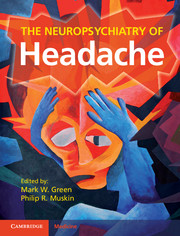Book contents
- The Neuropsychiatry of Headache
- The Neuropsychiatry of Headache
- Copyright page
- Contents
- Contributors
- Preface
- Chapter 1 Epidemiology of the psychiatric comorbidities of headache
- Chapter 2 Migraine
- Chapter 3 Tension-type headache
- Chapter 4 Mood disorder and headache
- Chapter 5 Anxiety disorders and primary headache
- Chapter 6 Stress and headache
- Chapter 7 Drug dependence in headache patients
- Chapter 8 The neuropsychiatry ofpsychosis and headache
- Chapter 9 Chronic daily headache
- Chapter 10 Stress management
- Chapter 11 Working with personality andpersonality disorders in the headache patient
- Chapter 12 Complementary and alternative medicine (CAM) approaches to headache
- Chapter 13 Somatoform disorders and headache
- Index
Chapter 3 - Tension-type headache
Published online by Cambridge University Press: 05 March 2013
- The Neuropsychiatry of Headache
- The Neuropsychiatry of Headache
- Copyright page
- Contents
- Contributors
- Preface
- Chapter 1 Epidemiology of the psychiatric comorbidities of headache
- Chapter 2 Migraine
- Chapter 3 Tension-type headache
- Chapter 4 Mood disorder and headache
- Chapter 5 Anxiety disorders and primary headache
- Chapter 6 Stress and headache
- Chapter 7 Drug dependence in headache patients
- Chapter 8 The neuropsychiatry ofpsychosis and headache
- Chapter 9 Chronic daily headache
- Chapter 10 Stress management
- Chapter 11 Working with personality andpersonality disorders in the headache patient
- Chapter 12 Complementary and alternative medicine (CAM) approaches to headache
- Chapter 13 Somatoform disorders and headache
- Index
Summary
- Type
- Chapter
- Information
- The Neuropsychiatry of Headache , pp. 21 - 29Publisher: Cambridge University PressPrint publication year: 2013



